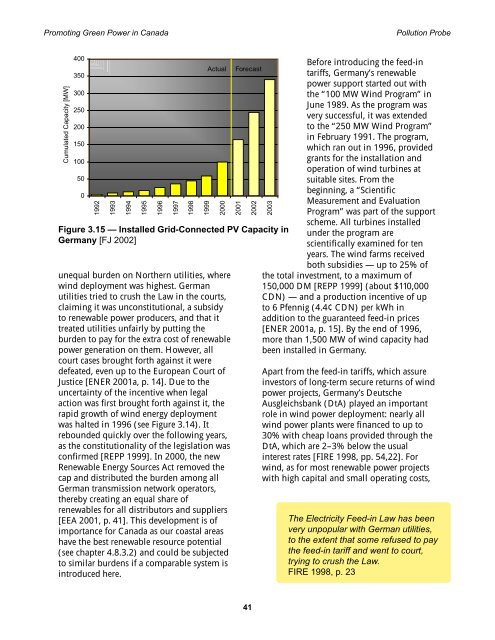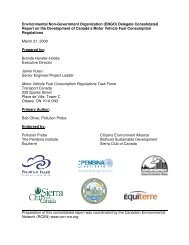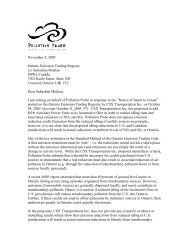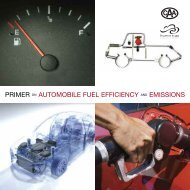Promoting Green Power in Canada - Centre for Human Settlements
Promoting Green Power in Canada - Centre for Human Settlements
Promoting Green Power in Canada - Centre for Human Settlements
- No tags were found...
You also want an ePaper? Increase the reach of your titles
YUMPU automatically turns print PDFs into web optimized ePapers that Google loves.
<strong>Promot<strong>in</strong>g</strong> <strong>Green</strong> <strong>Power</strong> <strong>in</strong> <strong>Canada</strong> Pollution ProbeCumulated Capacity [MW] ..400350300250200150100500199219931994199519961997Figure 3.15 — Installed Grid-Connected PV Capacity <strong>in</strong>Germany [FJ 2002]19981999Actual2000unequal burden on Northern utilities, wherew<strong>in</strong>d deployment was highest. Germanutilities tried to crush the Law <strong>in</strong> the courts,claim<strong>in</strong>g it was unconstitutional, a subsidyto renewable power producers, and that ittreated utilities unfairly by putt<strong>in</strong>g theburden to pay <strong>for</strong> the extra cost of renewablepower generation on them. However, allcourt cases brought <strong>for</strong>th aga<strong>in</strong>st it weredefeated, even up to the European Court ofJustice [ENER 2001a, p. 14]. Due to theuncerta<strong>in</strong>ty of the <strong>in</strong>centive when legalaction was first brought <strong>for</strong>th aga<strong>in</strong>st it, therapid growth of w<strong>in</strong>d energy deploymentwas halted <strong>in</strong> 1996 (see Figure 3.14). Itrebounded quickly over the follow<strong>in</strong>g years,as the constitutionality of the legislation wasconfirmed [REPP 1999]. In 2000, the newRenewable Energy Sources Act removed thecap and distributed the burden among allGerman transmission network operators,thereby creat<strong>in</strong>g an equal share ofrenewables <strong>for</strong> all distributors and suppliers[EEA 2001, p. 41]. This development is ofimportance <strong>for</strong> <strong>Canada</strong> as our coastal areashave the best renewable resource potential(see chapter 4.8.3.2) and could be subjectedto similar burdens if a comparable system is<strong>in</strong>troduced here.Forecast200120022003Be<strong>for</strong>e <strong>in</strong>troduc<strong>in</strong>g the feed-<strong>in</strong>tariffs, Germany’s renewablepower support started out withthe “100 MW W<strong>in</strong>d Program” <strong>in</strong>June 1989. As the program wasvery successful, it was extendedto the “250 MW W<strong>in</strong>d Program”<strong>in</strong> February 1991. The program,which ran out <strong>in</strong> 1996, providedgrants <strong>for</strong> the <strong>in</strong>stallation andoperation of w<strong>in</strong>d turb<strong>in</strong>es atsuitable sites. From thebeg<strong>in</strong>n<strong>in</strong>g, a “ScientificMeasurement and EvaluationProgram” was part of the supportscheme. All turb<strong>in</strong>es <strong>in</strong>stalledunder the program arescientifically exam<strong>in</strong>ed <strong>for</strong> tenyears. The w<strong>in</strong>d farms receivedboth subsidies — up to 25% ofthe total <strong>in</strong>vestment, to a maximum of150,000 DM [REPP 1999] (about $110,000CDN) — and a production <strong>in</strong>centive of upto 6 Pfennig (4.4¢ CDN) per kWh <strong>in</strong>addition to the guaranteed feed-<strong>in</strong> prices[ENER 2001a, p. 15]. By the end of 1996,more than 1,500 MW of w<strong>in</strong>d capacity hadbeen <strong>in</strong>stalled <strong>in</strong> Germany.Apart from the feed-<strong>in</strong> tariffs, which assure<strong>in</strong>vestors of long-term secure returns of w<strong>in</strong>dpower projects, Germany’s DeutscheAusgleichsbank (DtA) played an importantrole <strong>in</strong> w<strong>in</strong>d power deployment: nearly allw<strong>in</strong>d power plants were f<strong>in</strong>anced to up to30% with cheap loans provided through theDtA, which are 2–3% below the usual<strong>in</strong>terest rates [FIRE 1998, pp. 54,22]. Forw<strong>in</strong>d, as <strong>for</strong> most renewable power projectswith high capital and small operat<strong>in</strong>g costs,The Electricity Feed-<strong>in</strong> Law has beenvery unpopular with German utilities,to the extent that some refused to paythe feed-<strong>in</strong> tariff and went to court,try<strong>in</strong>g to crush the Law.FIRE 1998, p. 2341
















